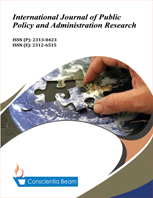The Life-Time of Tomorrow Party of Japan and Its Negative Impacts on the Anti-Nuclear Movements in Japan’s Politics
DOI:
https://doi.org/10.18488/journal.74/2015.2.2/74.2.29.39Abstract
The nuclear accident at Fukushima Daiichi in Japan on 11th March 2011 was unimaginably scary for the Japanese people and it was easily expected that Japan was going to abandon nuclear power with anti-nuclear political parties. Contrarily, Japan decided to maintain nuclear power with pro-nuclear political parties. This decision of Japan was influenced by the negative impacts brought by the Tomorrow Party of Japan (TPJ), the largest political party in the history of Japan which was established primarily to abandon nuclear power. The purpose of this paper is to look at the life-time of TPJ from 28th November to 27th December in 2012 and examine the negative impacts by TPJ on the anti-nuclear movements in Japan’s politics. The paper then discovers that the Japanese people came to lose trust in anti-nuclear political parties because they recognized, due to TPJ, that ‘anti-nuclear’ can be abused by politicians for elections, the characteristics of the ‘anti-nuclear’ village are not so different from those of the nuclear power village and the anti-nuclear party is an amateur without leaders. The paper finally concludes that it will take much time and efforts to regain a lost trust in anti-nuclear political parties.

